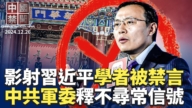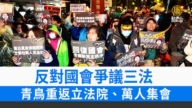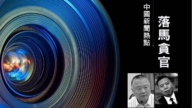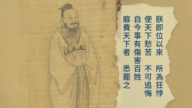【新唐人2013年03月04日訊】「兩會」召開前夕,有英國媒體在網上公開了一個籌備1年多,有關中共權力高層的人事、組織、社會關係和派系關係的數據庫,以網路頁面的形式揭開了中共官場的種種關係糾葛。讓我們一起來看看。
日前,英國《路透社》公布了一個名為「鏈接中國」的數據庫(網路鏈接為connectedchina.reuters.com)。這個數據庫採用了網絡技術的新概念,以大量互動式的圖表和鏈接,系統化的呈現出中共官場的真實面貌。
《路透社》宣稱,數據庫經過一年半左右的時間研發,包含成千上萬個項目,收錄的中共官場人物、組織和活動等,構成超過三萬種關係網絡。
香港《動向》雜誌主編張偉國:「雖然過去二、三十年裡面,陸陸續續已經有一些參與原來共產黨政治運作的一些官員、秘書、研究人員出了一些介紹內幕的情況,但是由於各種各樣的條件限制,所以整體上系統性的、全面的對這種問題的揭示還是一個空白。《路透社》這個東西出來,應該在這方面有拋磚引玉的作用。」
數據庫收錄的人物資料,包括從中共最高層核心,到市級地方官員,清晰展示了官場內誰和誰關係良好、官員獲誰的提拔擢升、派系身份、家庭成員、親屬任職等情況。甚至連官員的秘書、曾經表揚過何人、社會關係等底細、狀況,也加以整理並——呈現。
比如,對中共前政法委書記周永康的權力來源,數據庫是這樣描述的:江澤民在周永康的政治生涯中扮演了關鍵角色,兩人也是重要的盟友。周永康由曾慶紅推薦給江澤民,並在1999年鎮壓法輪功時取得了江的信任,成為江的「左右手」……
張偉國:「中共原來的那種愚民政策,要想繼續用封閉的那種手段去壟斷新聞資源,繼續搞內幕的交易,變得代價越來越大。這也是中國政治機制與現代文明發展潮流相碰撞的結果。」
加拿大時事評論員劉淇昆認為,在正常的社會,媒體是「三權分立」之外的第四權力,但是中國大陸的媒體在中共的操控下,無法發揮這種作用。
加拿大時事評論員劉淇昆:「結果出現一個很耐人尋味也頗為可笑的情況,就是外國的媒體充當起中國的第四權力來了。他揭露中國官場的情況,他對中國的官場起到了某種監督作用。或者由於他的揭露,中國老百姓能夠了解到官場的一些運作情況。」
劉淇昆還表示,《路透社》的數據庫有助於外界進一步了解中共的政治黑幕,不過對於中共當前的權力結構不會有重大的影響。
劉淇昆:「即將召開的兩會,我覺得並不是太重要,因為政協就不用說了,政協不過是個政治花瓶而已﹔就是人大,法律上說是國家最高權力機構,而誰都知道它不過是個橡皮圖章,真正重大的人事任命,在十八大召開之前就解決了。」
數據庫的發佈也引來了網民的議論。有不少人稱讚數據庫的資料全面深入,可能成為新一輪反腐利器,揭發更多的中共貪官。目前,《新浪》微博已經將數據庫名稱列為敏感詞,不予顯示相關內容。
採訪/常春 編輯/李明飛 後製/李智遠
Reuters Database Exposes Intricate Relationships in CCP’s Bureaucracy
Just before the Chinese Communist Party(CCP)’s
two conferences,
Reuters has published a database on the CCP’s senior personnel,
organizations, social relationships and faction relationships.
It took more than a year to develop this database,
which has disclosed all kinds of intricate relationships in the CCP’s bureaucracy.
Recently Reuters has published a database “Connected China”.
This database systematically unveils the reality of
China’s bureaucracy behind appearances,
by utilizing new internet technologies,
like interactive charts and link.
Reuters claims that it took one and half years
to develop this database.
The whole developing process incorporated tens of
thousands of projects, like records of China officials, organizations and their activities.
The types of relationships among China’s officials
can be as many as 30,000.
Zhang Weigua, Chief Editor of Hong Kong’s “The Trend”:
“In the past 20 or so 30 years,
some insider news has been disclosed here and there
by CCP officials, secretaries and researchers.
However, due to all kinds of limitations, it’s not systematic,
neither was it complete.
Now Reuters has published “Connected China” and
it is a very good starting point.”
The materials incorporated in the database include
information about CCP senior core leadership as well as about municipal local officials.
It clearly illustrates who the officials have a good
relationship with, who promoted which officials, faction identity, family members and relatives.
The database even has a record of who was praised by
which official and the relationship between them.
For example, the description of how Zhou Yongkang
gained his power is:
Jiang Zemin played an important role in Zhou Yongkang’s
political career. They are important allies.
Zhou Yongkang was referred to Jiang Zemin by Zeng Qinghong.
Zhou Yongkang earned Jiang Zemin’s trust by
cracking down on Falun Gong practitioners in 1999,
and then became Jiang’s “left and right hand”.
Zhang Weiguo: “The means that the CCP has been using
to fool people are getting more and more pricey.
They have to pay more if they want to continue
blocking news sources and committing shady deals.
This is the impact of the collision between
China’s system and modern civilization.”
Liu Qikun, Commentator from Canada, stated that
media is the fourth power beyond “separation of the three powers” in a normal society.
Nevertheless, in China media is under the party’s control
and cannot play its true role.
Liu Qikun: “It’s both thought-provoking and ridiculous
that overseas media have become China’s ‘fourth power’.
Overseas media have disclosed some information
on China’s officials and played a supervision role.
In this way, ordinary people in China can learn a little bit
about how China’s bureaucracy works.”
Liu Qikun stated that Reuter’s database can help people
further understand the CCP’s shady deals.
However, it won’t have a big impact on the
CCP regime’s current structure.
Liu Qikun: “The approaching two conferences
are not that important at all.
The Political Consultative Conference is nothing
but a ‘political vase’.
The National Congress is said to be ‘the highest
power structure’ in China legislatively.
However, we all know it’s nothing but a political show.
All important personnel arrangements have been
determined before the 18th National Congress.”
The publication of Reuter’s database has caused a lot
of online discussion.
Many people think that the database
is both complete and in depth.
It can be the new weapon to be used in anti-corruption
and thus expose more corruptive officials.
Now “Sina” has already listed Reuters’ database
name as a “sensitive” word and you can’t find anything if you search for it online.





























